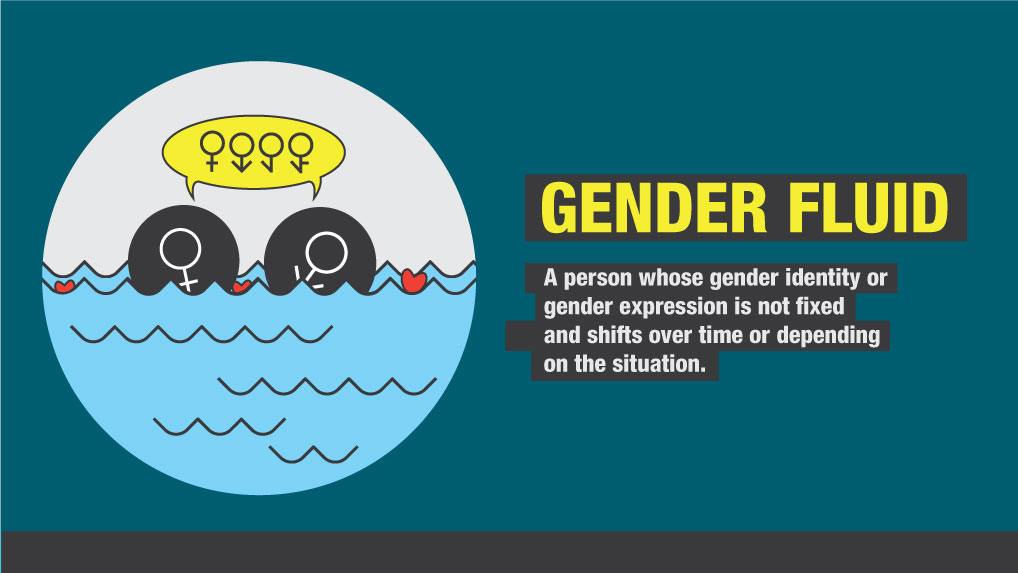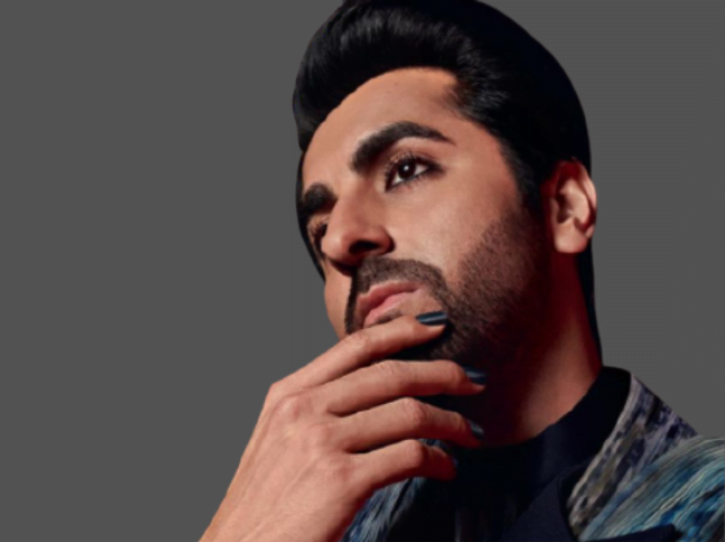Recently, Indian actor, singer and writer Ayushman Khurrana appeared on the cover of the fashion magazine GQ India‘s December edition. On the cover, he is featured wearing makeup that ventures into the domain of what is typically considered feminine – some eye makeup and nail paint.
The magazine has made him the face of their ‘Men of the Year- Year of the Brave’ edition. The cover also, in bold lettering, calls him a ‘gamechanger‘. Ayushman Khurrana posted a picture of the cover of the magazine on his Instagram handle with the caption ‘Gender fluid’.
There was an immediate backlash from the LGBTQIA+ community against the cover, and rightfully so. The wrong use of the word genderfluid, reducing it to an aesthetic, the placing of Ayushman Khurrana on a pedestal, the utterly erroneous understanding of gender fueled by his soon to be released transphobic film, are all aspects of the cover that are problematic and enraging.
The anger and disappointment, including my own, were accelerated because he has been painting himself as an ally to the queer community for years only to turn around and capitalise on the community. He has been willfully obtuse and ignorant of queer voices and is complicit in spreading transphobia under the guise of trans allyship. This is perhaps also more harmful because it teaches even the most well-intended people to normalise transphobia without them even realising it. All of it is further worsened by his fame, his massive reach and influence.
A genderfluid person may change their outward gender expression to correspond to their ‘shifts’, but this is not necessary. The same goes for pronouns – they may use different pronouns on different days or use the same set of pronouns across these changes. Some genderfluid people may not express these changes at all and just acknowledge them within themselves, or they may need people around them to acknowledge it and adjust accordingly (such as by using a particular set of pronouns). To sum up, there is no right or better way to be genderfluid, and the only ‘requirement’ is to identify as such
What does genderfluid really mean?
Genderfluid is a gender identity that comes under the larger umbrella of non-binary identities (which in turn comes under the umbrella of trans identities).
People who identify as genderfluid (like me) feel their gender identity shifting over intervals of time. This can be a few hours, a few days, months or even years- it depends on the individual. These ‘shifts’ are not necessarily just between ‘man’ and ‘woman’ but can be between a range of identities like agender, demigirl, demiboy, bigender etc. It is also important to remember that no matter what ‘day’ they are having, a genderfluid person is always genderfluid.
A genderfluid person may change their outward gender expression to correspond to their ‘shifts’, but this is not necessary. The same goes for pronouns – they may use different pronouns on different days or use the same set of pronouns across these changes. Some genderfluid people may not express these changes at all and just acknowledge them within themselves, or they may need people around them to acknowledge it and adjust accordingly (such as by using a particular set of pronouns). To sum up, there is no right or better way to be genderfluid, and the only ‘requirement’ is to identify as such.
Being genderfluid is not an aesthetic
If there are no requirements to being genderfluid, why are we upset with Ayushman Khurrana’s caption? The answer is simple. Ayushman Khurrana does not identify as genderfluid. He has repeatedly said that he is a cisgender, heterosexual man and simply an ally to the community. Therefore, he cannot use the word genderfluid and treat it like a discardable aesthetic. If putting on makeup makes him genderfluid, one wonders, does washing his makeup off take it away? Or does any man who has ever put on makeup automatically become queer?
Calling oneself genderfluid for going slightly beyond the strict borders of masculinity is absolutely ridiculous and disrespectful towards people who do identify as genderfluid. Identities that face oppression are not aesthetics to be appropriated by the privileged. The only time a person should call themselves genderfluid is when they identify as such.
It is also important to remember that sometimes people identify a certain way and then realise that they prefer another label. If any such person has ever called themselves genderfluid, but then decided that they aren’t, that is completely valid. What is not valid is a cisgender person appropriating the label for a marketing gimmick.
Also read: No, J.K. Rowling, Cis Women Should Not Play Gatekeepers To Trans Women

Gender expression does not equal gender identity
This, however, does not mean that cisgender people are not allowed to explore gender expression. Ayushman Khurrana as a cisgender heterosexual man is in no way obligated to stick to what is traditionally considered masculine. He is more than welcome to wear eyeliner and paint his nails. If tomorrow he decides to put on a dress – something considered strictly feminine, good for him! But that is not his ticket into the queer community.
This is because gender expression does not equal gender identity. This is a very harmful notion that affects both cisgender and transgender people. Every single person, irrespective of their gender identity, gets trapped into a rigid box. It is important to note that this affects transgender folk more convolutedly. Trans exclusionary radical feminists (TERFs) like J.K. Rowling have often used this notion to justify their transphobia by saying that transgender women don’t become women by wearing dresses.
Calling him ‘Brave Man of the Year’ is almost laughable. As mentioned before, he is only doing what queer people have always been doing. The difference is, he is doing this in the safety of a secure studio. Queer people face extreme opposition when they just try to exist. They are ridiculed, isolated and subject to violence. To partake in queer culture without acknowledging the oppression members of the community face and being blind to your own privilege is disrespectful, to say the least
Transgender women do not become women by wearing dresses, in fact, they don’t ‘become’ women at all, because they simply are. If they choose to express this by wearing dresses, that is a personal choice, but they can also choose to not. Trans people are often also made to ‘prove’ their transness. Trans women are pressured to be feminine, trans men to be masculine and nonbinary people to be androgynous.
I, too, have been told that I am ‘faking’ being nonbinary because I am femme and AFAB (assigned female at birth). I know from personal experience how harmful the notion of equating gender expression to gender identity is. The experiences of both cis and trans people from around the world only affirms it time and time again.
Just how brave is Ayushman Khurrana?
On the cover, Ayushman Khurrana has been deemed a ‘gamechanger’. But why is he a gamechanger? For putting on makeup? Queer people have been doing that for years. Why is it that when a queer person does it, they are ‘shoving their identity into people’s faces’, but a cis-het person doing it is brave?
Calling Ayushman Khurrana a gamechanger for doing something that has been done for years and years is erasure of the queer community and their culture. Of course, he is more than welcome to wear makeup, but he cannot be pedestalised for doing so, neither can he be free of accountability for his double standards.
This also ties into Ayushman Khurrana being titled the ‘face of lifting up the queer community’. Why would a non-queer person be the face of the queer community? I realise that this is not a title he has given himself, and this is the fault of the people who have bestowed him with it. But wouldn’t a true ally, keeping the best interests of the community in mind, refuse to accept this moniker and address how problematic it is? He seems to have chosen to smile and thank people and profit off of it, instead.

Calling him ‘Brave Man of the Year’ is almost laughable. As mentioned before, he is only doing what queer people have always been doing. The difference is, he is doing this in the safety of a secure studio. Queer people face extreme opposition when they just try to exist. They are ridiculed, isolated and subject to violence. To partake in queer culture without acknowledging the oppression members of the community face and being blind to your own privilege is disrespectful, to say the least.
Chandigarh Kare Aashiqui, Ayushman Khurrana’s latest release
The icing on this transphobic cake is Ayushman Khurrana’s latest release, Chandigarh Kare Aashiqui (2021, dir. Abhishek Kapoor). It is a film about a cisgender man who falls in love with a woman and later discovers that she is a transgender individual.
The GQ cover was clearly an effort to promote this film and show Ayushman Khurrana’s “allyship” to the queer community. However, this film is transphobic in itself. First of all, the trans woman is played by a cis actress, Vaani Kapoor. Why this role was not given to a trans actress is unclear, but the reason seems to be the same as every time. They care enough about transgender people to make them an object of pity and profit off of them, but not enough to actually employ them. Being trans is not a costume, it is not “just acting”.
Secondly, if it really is “just acting”, why aren’t trans actors employed in cisgender roles? The day that becomes normalised, we can have this conversation. Transgender people already face issues with employment, and asking to be part of their own narratives shouldn’t be considered controversial.
Thirdly, the film seems to employ transness as a comic trope, rather than transphobia. It perpetuates the stereotype that trans women are inherently dishonest and try to ‘trap’ cisgender men. When there is comedy about an oppressed community, the lack of logic behind their oppression should be the joke and not their very existence.
No, we don’t have to be be thankful to Ayushman Khurrana
Some (cis-het) people have been shaking their heads at our objections and saying that we are being ungrateful, that we need to be thankful that at least someone is representing us. To these people I say – You have revealed your internal biases. Are we that dismissible that we need to be grateful for the slightest acknowledgement of our existence?
Moreover, because of the way our society is built, this film may be the first time some people look at transgender folk. These ( perhaps occasionally well-intentioned) people will then internalise the misconceptions about transgender people as truth. Why are you willingly contributing to the spread of misinformation about an already misunderstood group? The ‘misrepresentation is still representation’ discourse is very harmful for this reason.
Films like this generate biases for impressionable young minds that will consequently become transphobic without even realising it. Unlearning is always harder than learning, and you are actively teaching and normalising transphobia that will be difficult to unlearn.
Also read: How I Was Bullied As A Child For Being Gender Non-Conformist
True allies do not use their allyship as a pass to appropriate queer culture but recognise that they shouldn’t. My message to Ayushman Khurrana is – if you really want to be an ally to the community, listen to us. Use your privilege to amplify queer voices instead of drowning them out with your own noise of supposed allyship. And, if you aren’t going to do any of that, at least do the bare minimum of not actively harming us with gross misrepresentation.
Featured Image Source: Indiatimes
About the author(s)
Jyni Verma is a writer with a focus on gender, intersectionality, social justice issues and cultural analysis. They are currently pursuing their masters in sociology at Jamia Millia Islamia.





